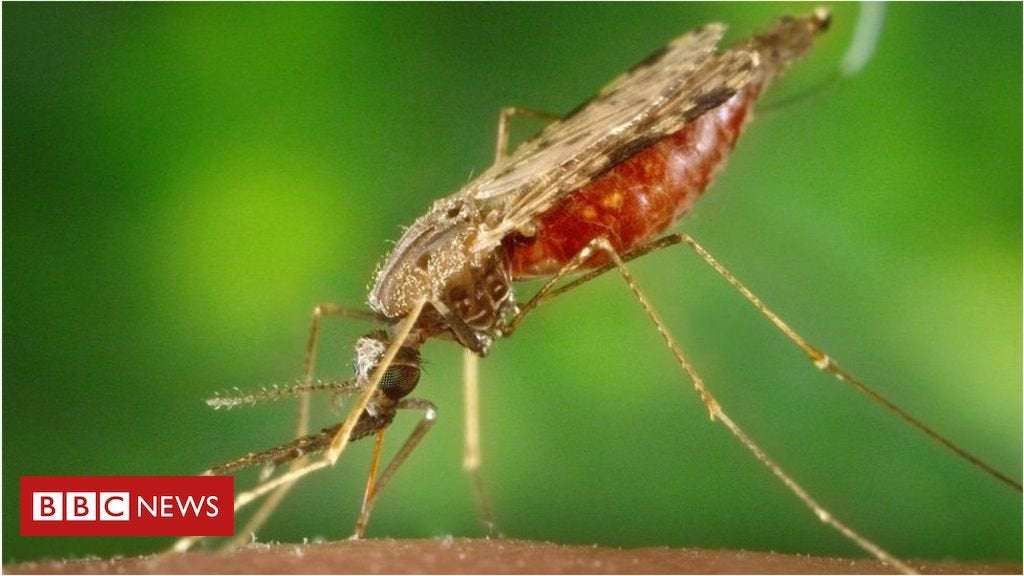Image copyright Getty Images Image caption Malaria is spread by the bite of infected mosquitoes
Scientists have discovered a microbe that completely protects mosquitoes from being infected with malaria.
The team in Kenya and the UK say the finding has "enormous potential" to control the disease.
Malaria is spread by the bite of infected mosquitoes, so protecting them could in turn protect people.
The researchers are now investigating whether they can release infected mosquitoes into the wild, or use spores to suppress the disease.
The malaria-blocking bug, Microsporidia MB, was discovered by studying mosquitoes on the shores of Lake Victoria in Kenya. It lives in the gut and genitals of the insects.
The researchers could not find a single mosquito carrying the Microsporidia that was harbouring the malaria parasite. And lab experiments, published in Nature Communications, confirmed the microbe gave the mosquitoes protection.
Microsporidias are fungi, or at least closely related to them, and most are parasites.
However, this new species may be beneficial to the mosquito and was naturally found in around 5% of the insects studied.
"The data we have so far suggest it is 100% blockage, it's a very severe blockage of malaria," Dr Jeremy Herren, from the International Centre of Insect Physiology and Ecology (icipe) in Kenya told the BBC.
He added: "It will come as a quite a surprise. I think people will find that a real big breakthrough."
More than 400,000 people are killed by malaria each year, most of them children under the age of five.
While huge progress has been made through the use of bed nets and spraying homes with insecticide, this has stalled in recent years. It is widely agreed new tools are needed to tackle malaria.
Image copyright Getty Images Image caption Bed nets have helped cut the number of people infected with malaria around the world
How does the microbe stop malaria?
The fine details still need to be worked out.
But Microsporidia MB could be priming the mosquito's immune system, so it is more able to fight off infections.
Or the presence of the microbe in the insect could be having a profound effect on the mosquito's metabolism, making it inhospitable for the malaria parasite.
Microsporidia MB infections appear to be life-long. If anything, the experiments show they become more intense, so the malaria-blocking effect would be long-lasting.
When can this be used against malaria?
At the very least, 40% of mosquitoes in a region need to be infected with Microsporidia in order to make a significant dent in malaria.
The microbe can be passed between adult mosquitoes and is also passed from the female to her offspring.
So, the researchers are investigating two main strategies for increasing the number of infected mosquitoes.
Microsporidia form spores which could be released en masse to infect mosquitoes
Male mosquitoes (which don't bite) could be infected in the lab and released into the wild to infect the females when they have sex
"It's a new discovery. We are very excited by its potential for malaria control. It has enormous potential," Prof Steven Sinkins, from the MRC-University of Glasgow Centre for Virus Research, told the BBC.
This concept of disease control using microbes is not unprecedented. A type of bacteria called Wolbachia has been shown to make it harder for mosquitoes to spread dengue fever in real-world trials.
The scientists need to understand how the microbe spreads, so they plan to perform more tests in Kenya.
However, these approaches are relatively uncontroversial as the species is already found in wild mosquitoes and is not introducing something new.
It also would not kill the mosquitoes, so would not have an impact on ecosystems that are dependent on them as food. This is part of other strategies like a killer fungus that can almost completely collapse mosquito populations in weeks.

IamSauce4 on May 4th, 2020 at 15:07 UTC »
Unfortunately, the fungus that prevents Malaria causes a host of other maladies in other creatures. Hopefully they can find a variety that exclusively affects mosquitoes.
https://en.wikipedia.org/wiki/Microsporidia
three_two_one_G0 on May 4th, 2020 at 12:39 UTC »
According to the article, to be effective, >40% of mosquitoes in a given area would need to be infected. I believe this could be a challenge, but offers real possibility in areas where malaria is not yet endemic but expected to spread in the near future due to climate change.
zadharm on May 4th, 2020 at 11:57 UTC »
Really interesting, this looks super promising. 100% blockage of malaria in mosquitos with the fungus could be an absolute game-changer.
My question is, what effect would eliminating malaria have on food systems? It says in the article that the mosquitos don't die from it so it wouldn't interrupt food chains, but would eliminating malaria cause a population spike in other species? What effect (if any) does this fungus have on other insects that are exposed? Would contact with infected insects potentially reduce yield for farming in the region (potentially leading to more deaths than malaria itself)? This is really exciting but the "butterfly effect" potential must be examined closely before we even consider this. I'm aware the fungus is already wild but the article isn't clear on if it's native, and we're talking about dramatically increasing its presence regardles
Edit: ha ha ha, you're all very funny, but can we please stop replying with the same "yeah, humans!" joke. Obviously eliminating 400,000 malaria deaths a year is going to make a difference in human population. My concern is it playing with the ecosystem and eventually leading to a collapse. Playing with ecosystems is tricky business